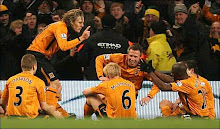
Phil Brown believes in Dean Marney. Here he differs with the supporters, who have still never quite been able to accept him entirely as a worthwhile Hull City player.
Marney's return to the side after suspension against Wigan Athletic typified his frustrating, brainstorming existence in a Tigers shirt. Clearly he is good enough and talented enough, but inconsistency and carelessness get in the way far too often.
It was Marney's lack of awareness and urgency in his own box in the last five minutes which allowed Ben Watson to thieve the ball and lob an out-of-position Matt Duke for Wigan's late winning goal. Prior to this, Marney had also been castigated by the fans - and highlighted by the pundits - for losing the ball in midfield when his defence were still up for a set-piece and allowing a dangerous counter attack which only failed to result in a goal through sheer fortune.
Marney had to return to the side. He was fit and fresh after his three matches away, and we'd lost Ian Ashbee's industry and leadership thanks to a dodgy hamstring. Marney cannot necessarily provide leadership, although he was given the captain's armband for the two FA Cup ties against Sheffield United while Ashbee rested and was certainly not disgraced, but he can do industry. Despite his obvious vision and ball skills, maybe it's his status as a workhorse which may yet salvage his Hull City existence.
Too often Marney has flattered to deceive by going from a superb, all-dominant spell in the side to supplying his own stick with which the fans may beat him. When the Tigers were playing 4-3-3 and earning 20 points from the first ten games, Marney was part of the central three and playing out of his skin. His energy, his vision and his unflappability were all plain to see and with both Ashbee and George Boateng providing a solidified back-up, he had licence to run, with and without the ball, supporting Geovanni's roams and finding himself alongside the two centre forwards.
Upon the abandonment of that system and City's own form, Marney began to flag. Rewarded with the new contract his early performances merited, the ex-Spurs midfielder became a little more withdrawn, and here the old Marney began to show its ugly head again. The misplaced passes, the soft concessions of possession, the total lack of positional sense, the indiscipline and occasionally the wayward set pieces (although his corner taking generally has been very good all season). He played well at Chelsea, as did the whole team, but the golden scoring chance he missed, which would have put City ahead deep into the second half, again was typical of the player's capacity to frustrate himself and all those around him when we all know he can do better. The acquisition of Jimmy Bullard looked to have put paid to Marney's own place in the side, but his stay of execution granted via Bullard's knee specialist didn't ultimately re-ignite Marney's worthiness to the cause.
As City's winless streak extended and extended, Marney became the first to snap truly with the frustration when he kicked the odious Morten Gamst Pedersen up in the air after a poor challenge from the Blackburn Rovers player and rightly was shown City's only straight red card of the campaign. Three games out followed where he wasn't greatly missed and he no doubt had food for thought while watching his team-mates beat Fulham, draw with Newcastle and come within one hateful referee of earning a replay in the FA Cup quarter final.
With Boateng returning soon and Ashbee's hamstring niggle thought to be no more than just that, Marney's role in Brown's plan for the season may become slightly more restricted. City need reliable performers more than anything right now, especially with our next three matches coming, definitively, against opponents all currently below us in the table. Marney is so obviously a confidence player and maybe that confidence is just as well served if he sat out another game or two, itching to come on.
Next season Marney's position will come under further scrutiny when Bullard is fit. There does seem to be goodwill for him to do well, given his amazing energy for the side when he shows a bit of form and his very good contribution to the early part of this season (not to mention a largely excellent campaign last year and his dreadfully unfortunate absence from the play-off campaign, aside from injury time at Wembley). But as the stakes get higher and the possible replacements look so much so better, that goodwill may soon evaporate forever.


















.jpg)






